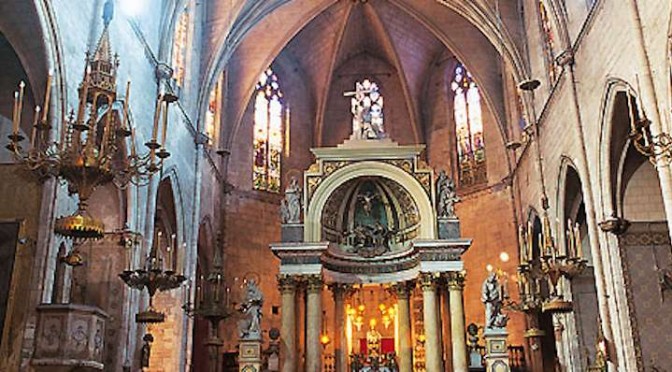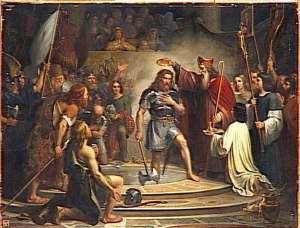 The Frankish peoples own legends talk of Clovis’ conversion to Roman Christianity because of a victory he gained over the Allemagnii, in which he believed he obtained help from the Christian God. They also talk of gentle persuasion from his wife, St Chlotilde, a disaffected Burgundian. Gregory of Tours claimed that St Chlotilde’s father and mother were murdered by the Burgunian king (Gundobad) an Arian Christian. Her mother was supposed to have been thrown into the Rhone and swept away.
The Frankish peoples own legends talk of Clovis’ conversion to Roman Christianity because of a victory he gained over the Allemagnii, in which he believed he obtained help from the Christian God. They also talk of gentle persuasion from his wife, St Chlotilde, a disaffected Burgundian. Gregory of Tours claimed that St Chlotilde’s father and mother were murdered by the Burgunian king (Gundobad) an Arian Christian. Her mother was supposed to have been thrown into the Rhone and swept away.
In this explanation the Church had no direct involvement in Clovis’ conquests, other than to carry out the baptism. Clovis was then inspired by his conversion to carry out his conquests, which incidentally were characterised by his willingness to murder his father, brothers and sons in-law!
In fact almost certainly Clovis was already an Arian Christian who had however never totally abandoned pagan sympathies. The baptism legend, desperately supported at a much later date, was simply a cover for the real reason for his selection which is still shrouded in mystery.
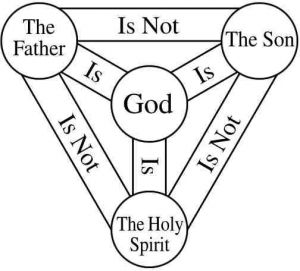
In 496 the Bishops of Rome were desperate.
In 496 their version of the Christian faith, the trinitarian doctrine, was almost extinguished. All the candidates for leadership in the west enumerated above and including Clovis, were Arians, Christians of a different faith. The ordinary people everwhere, believed in the Arian Version of Christianity.
In the East the Bishops of Rome fared little better. There, the Bishops of Constantinople challenged the Bishop of Rome’s spiritual authority and had Arian sympathies. There also, in the countryside, the majority of Christians espoused the Arian faith. Until recently there had only been one non-Arian church in Constantinople.
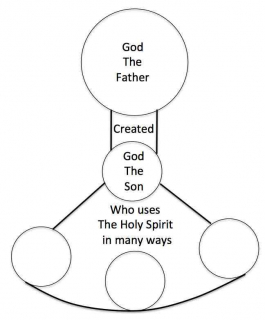 The Popes in Rome simply could not adopt Arian beliefs. It was in direct conflict with their teaching for the past five hundred years and it would have left them with no credibility.
The Popes in Rome simply could not adopt Arian beliefs. It was in direct conflict with their teaching for the past five hundred years and it would have left them with no credibility.
Perhaps more importantly for the men who ran the Church, it demanded a separation from the very thing that the Roman Church had come to value and depend on for its remaining influence, temporal wealth and temporal power!
The Arian Christians had a weakness however. In the best tradition of Christ’s teaching they were tolerant. They did not see the Roman Church as a threat. They believed its mysticism, including a virgin birth by which Christ emerged though his mothers ear, to be almost laughable.
The people resented and ridiculed the Roman Church’s preoccupation with worldly possessions. They saw splendid churches as irrelevant, preferring to meet in each others homes or as they were celts in woods on mountains or by streams.
 They were alienated by the creation of “sacraments” which were carried out with what the Arians perceived as unnecessary pomp and ceremony. Despite all these reservations they allowed the Roman Church to continue, to build it’s hierarchical, worldly, administration and construct its churches. They believed that the Arian beliefs would prevail!
They were alienated by the creation of “sacraments” which were carried out with what the Arians perceived as unnecessary pomp and ceremony. Despite all these reservations they allowed the Roman Church to continue, to build it’s hierarchical, worldly, administration and construct its churches. They believed that the Arian beliefs would prevail!
However in the years leading up to 496, their tolerance reached its limit; the temporal possessions of the Church were seen as oppressive. Lords and their subjects demanded a reduction in the diversion of community wealth into Church coffers. To the Roman Church this was an unwarranted attack on their power base. They felt that they had to respond. They had to mobilise temporal forces to act in their defence.
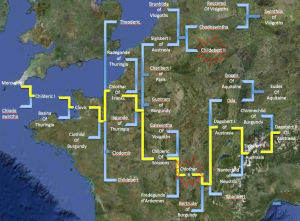
It is possible that the Church did consider reaching an agreement with the Goths, but that Theodoric having seen the religious dissention in onstantinople preferred the western pattern in which trinitarian and Arian beliefs co-existed. Also there were obviously other factors at work.
It was Clovis himself who saw the opportunity. An agreement was brokered with the Church. Having chosen Clovis as their saviour, the Roman church would throw all of its resources behind his campaigns. When the agreement was implemented the Church ignored Clovis’ undoubted duplicity, his amorality and his brutality. These were dismissed as the weakness of man.
Thus whilst Clothar, Clovis’ son was murdering his nephews and later when Sigisbert of Austrasia and Chilperic of Soissons were at war because Chilperic had murdered his wife, the the Roman Church continued to act as agent of the Merovingians in procuring alliances and providing intelligence to allow them to overcome opponents. in return playing an important part in the governance of their domains, the Merovingians guaranteed the continuance of the Church’s sources of wealth and their freedom to recruit people to the Roman faith.
 There was often conflict with the local church who often considered they had authority for civil administration. Some Bishops acquired land, recruited Knights and acted as if they were Barons. In any event the bishops took over civil administation and took it on themselves to advise Comptes and barons on ever aspect of their tenure. The Pope monitored every state, every Compte though the use of Legates, just as the senate used to do. Now however their was no need for an emergency. the legates were everywhere ensuring that the Pope’ message was heard, listening for any hint of non conformity,The Merovingians reached a longer term agreement, which enabled him to govern conquered territories without a great deal of effort to set up administrative structures. For the period of his rule Clovis only emerged from his home territory for occasional military campaigns.
There was often conflict with the local church who often considered they had authority for civil administration. Some Bishops acquired land, recruited Knights and acted as if they were Barons. In any event the bishops took over civil administation and took it on themselves to advise Comptes and barons on ever aspect of their tenure. The Pope monitored every state, every Compte though the use of Legates, just as the senate used to do. Now however their was no need for an emergency. the legates were everywhere ensuring that the Pope’ message was heard, listening for any hint of non conformity,The Merovingians reached a longer term agreement, which enabled him to govern conquered territories without a great deal of effort to set up administrative structures. For the period of his rule Clovis only emerged from his home territory for occasional military campaigns.
His realm was soon run by the Church, who in turn controlled and occasionally fought with local landholders. Every direction of the Bishops was overshadowed with the threat that a Merovingian monarch would arrive to impose their will. Bishops of the Roman Church subsequently played an important role in French government almost until the revolution.
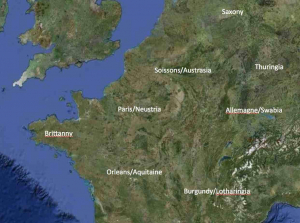 The result was the continual rearrangement of the various kingdoms, not only modifying their boundaries but also their names. It made others realise that if they could secure control of a specific geographical area then they also could aspire to kingship.
The result was the continual rearrangement of the various kingdoms, not only modifying their boundaries but also their names. It made others realise that if they could secure control of a specific geographical area then they also could aspire to kingship.
It terms of the way Clovis appointment was explained, it mattered little whether the bloodline was a reality or a fabrication. All those with aspiration to rule became concerned to prove that they shared the same Messianic blood line which had been used to justify the selection of Clovis and his descendants.
